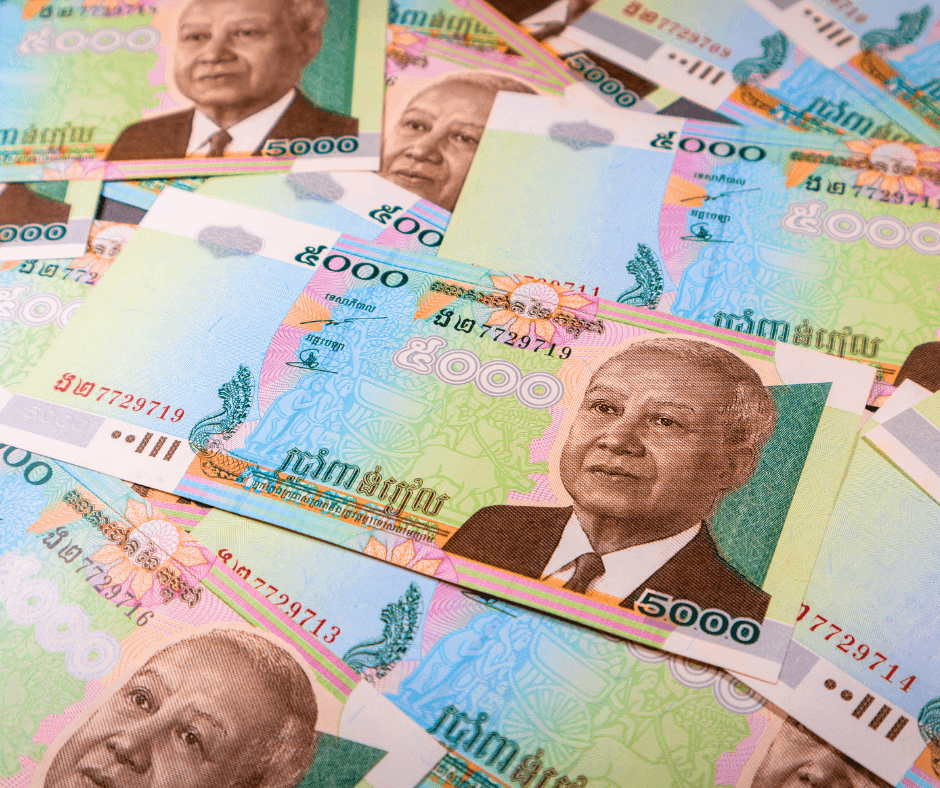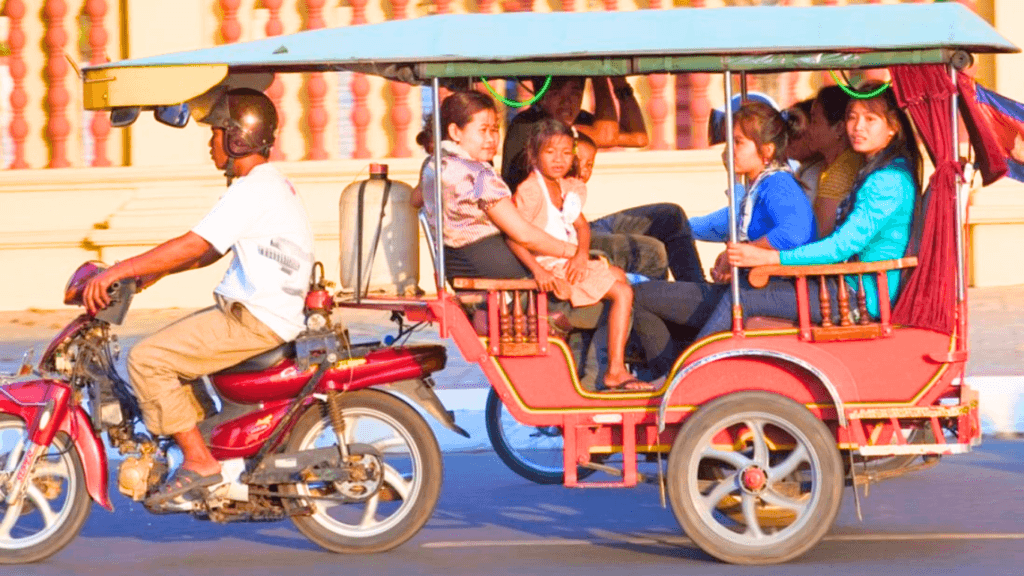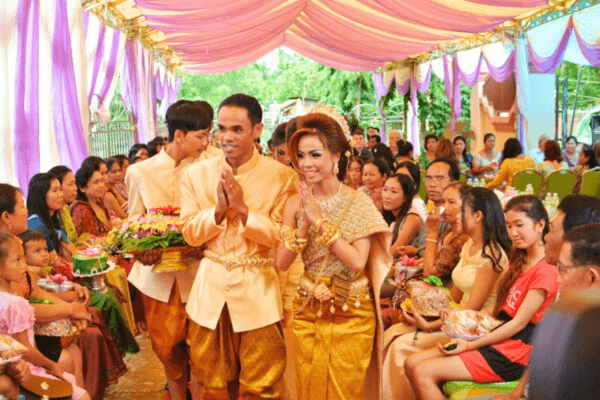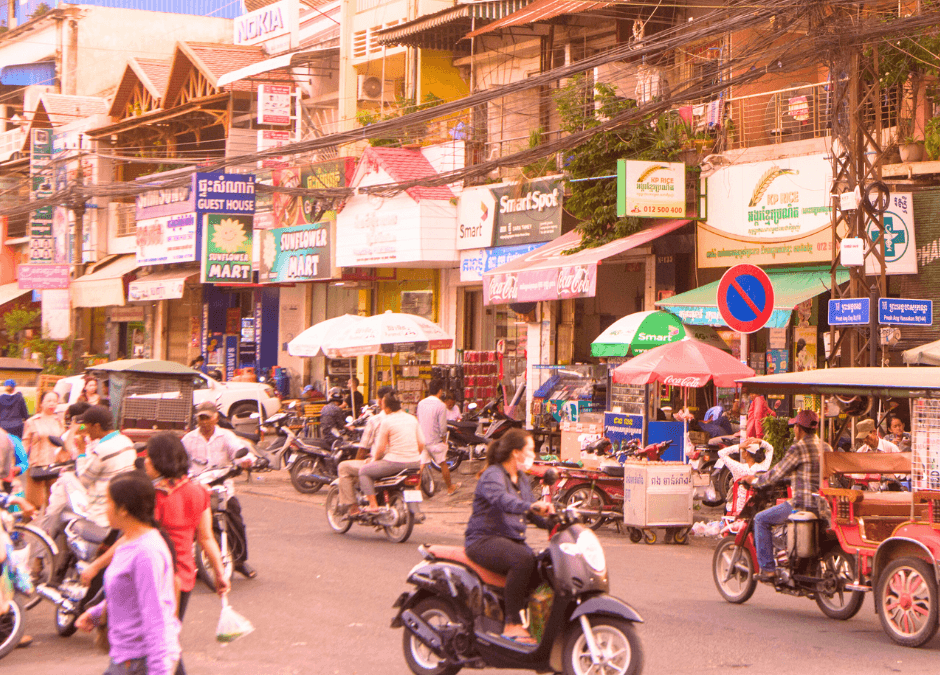Upon arrival in Cambodia, foreign English as a Second Language (ESL) teachers have many things to consider and organise: finding a place to live, opening a bank account, making friends, settling into a new job, where to get a great coffee, and a lot more. Navigating ‘language barriers’ on arrival (and after that) can be challenging in Cambodia, which has its own alphabet. Learning some essential words and phrases in the Cambodian language (also known as Khmer) will ease your transition into the Khmer culture and give you some brownie points with the locals. From my personal experience, local people love to see foreigners having a go with the Cambodian language. It’s an engaging talking point in its own right.
In this article, I’ll touch on how to read and say 104 words and phrases in Cambodian. Despite its shortcomings, ‘Google Translate’ is a good place to practice pronouncing Khmer words (for free). You can log in to ‘Google Translate’ via the following link: https://translate.google.com.au/?sl=auto&tl=km&op=translate
1: Basic Greetings and Manners
These everyday phrases in the Cambodian language are essential for greeting and interacting with people politely:
- Hello – សួស្តី (suosdei)
- Goodbye – លាហើយ (leahaey)
- Thank you – អរគុណ (awkun)
- Yes – បាទ/ចាស (bat/cha)
- No – ទេ (te)
- Please – សូម (som)
- Sorry – សុំទោស (somtoh)

2: Common Statements and Questions
Knowing a few basic statements and questions in the Cambodian language will help you engage with local people. Check out the following:
- How are you? – អ្នកសុខសប្បាយទេ? (neak sok sabay te?)
- What is your name? – អ្នកឈ្មោះអ្វី? (neak chmuah avei?)
- My name is… – ខ្ញុំឈ្មោះ… (khnhom chmuah…)
- Do you speak English? – អ្នកនិយាយភាសាអង់គ្លេសបានទេ? (neak niyeay pheasa angkles ban te?)
- I don’t understand – ខ្ញុំមិនយល់ទេ (khnhom min yul te)
- Where is…? – ឯណា…? (ae na…?)
3: Numbers
If you learn how to count to ten in the Cambodian language, with practice, you’ll know how to count to one million and beyond quicker than you think. How is that so? The numbers basically repeat themselves. For example, one in Khmer is ‘muoy’, eleven in Khmer is ‘dbmuoy’, two in Khmer is ‘pir’, twelve in Khmer is ‘dbpir’, three in Khmer is ‘bei’, thirteen in Khmer is ‘db bei’. Knowing basic numbers in the Cambodian language will make your life so much easier in everyday situations, including buying a product or service, asking and answering questions about age, discussing distance, weights, measures, and more.
- One – មួយ (muoy)
- Two – ពីរ (pii)
- Three – បី (bei)
- Four – បួន (buon)
- Five – ប្រាំ (pram)
- Six – ប្រាំមួយ (pram muoy)
- Seven – ប្រាំពីរ (pram pi)
- Eight – ប្រាំបី (pram bei)
- Nine – ប្រាំបួន (pram buon)
- Ten – ដប់ (dop)

4: Days of the Week
When you understand how to read and express the days of the week in the Cambodian language, you will be able to plan and organise your schedule with relative ease:
- Monday – ថ្ងៃច័ន្ទ (thngay chan)
- Tuesday – ថ្ងៃអង្គារ (thngay angkea)
- Wednesday – ថ្ងៃពុធ (thngay put)
- Thursday – ថ្ងៃព្រហស្បតិ៍ (thngay prohas)
- Friday – ថ្ងៃសុក្រ (thngay sok)
- Saturday – ថ្ងៃសៅរ៍ (thngay sao)
- Sunday – ថ្ងៃអាទិត្យ (thngay atit)
5: Food and Dining
Dining out in Cambodia is very affordable. This means you will most likely be eating out at least once a day – here are some useful words and phrases in the Cambodian language to assist you:
- Food – ម្ហូប (mhoop)
- Water – ទឹក (teuk)
- Rice – ស្រូវ (srov)
- Chicken – សាច់មាន់ (sach moan)
- Fish – ត្រី (trey)
- Vegetables – បន្លែ (banlae)
- Fruit – ផ្លែឈើ (phlae chheu)
- Coffee – កាហ្វេ (ka-fe)
- Tea – តែ (te)
- Beer – ស្រាបៀរ (sra-bia)

6: Travel and Directions
Getting around in Cambodia is relatively cheap and easy for expats – make it even easier with these useful words in Khmer:
- Taxi – តាក់ស៊ី (tak-si)
- Bus – ឡានក្រុង (lan krong)
- Train – រទេះភ្លើង (roteh phlerng)
- Airport – អាកាសយានដ្ឋាន (akasayandthan)
- Hotel – សណ្ឋាគារ (sonthakia)
- Restaurant – ភោជនីយដ្ឋាន (phochaniyatharn)
- Left – ឆ្វេង (chhveng)
- Right – ស្ដាំ (sdam)
- Straight – ទៅមុខ (tov mok)
- Near – ជិត (chet)
7: Money Matters
Whether you’re shopping at the mall or the local marketplace, the following words in the Cambodian language will be very handy:
- How much? – តើមានតម្លៃប៉ុន្មាន? (tae mean damlay ponman?)
- Expensive – ថ្លៃ (thlay)
- Cheap – ថោក (thaok)
- Money – លុយ (luy)
- Market – ផ្សារ (psa)
- Shop – ហាង (hang)
- Buy – ទិញ (teinh)
- Sell – លក់ (luak)
- Discount – បញ្ចុះតម្លៃ (banchoh damlay)

8: Emergencies
Here are some words in Khmer for handling emergencies, that hopefully you’ll never have to use:
- Doctor – វេជ្ជបណ្ឌិត (vechabondet)
- Hospital – មន្ទីរពេទ្យ (montipet)
- Pharmacy – ហ្វាម៉ាស៊ី (phama-si)
- Help! – ជួយផង! (chuoy pong!)
- Danger – គ្រោះថ្នាក់ (kruoh thnak)
- Fire – ភ្លើង (phlerng)
- Police – ប៉ូលីស (polis)
- Ambulance – ឡានសង្គ្រោះបន្ទាន់ (lan songkruah bontan)
9: Everyday Activities and Hobbies
Everyone loves ‘small talk’. It’s a great way to get to know people. Here are some valuable words in the Cambodian language to get a bit of ‘small talk’ happening with a local person:
- Eat – ញុំា (nham)
- Drink – ផឹក (phoek)
- Sleep – គេង (keng)
- Read – អាន (an)
- Write – សរសេរ (sorsae)
- Work – ធ្វើការ (thveu ka)
- Play – លេង (leng)
- Walk – ដើរ (daer)
- Run – រត់ (rot)

10: Household Objects
Here are some words in the Cambodian language for household objects that you’ll find useful:
- House – ផ្ទះ (phtes)
- Car – ឡាន (lan)
- Bicycle – កង់ (kong)
- Phone – ទូរស័ព្ទ (toursap)
- Computer – កុំព្យូទ័រ (kompiutear)
- Book – សៀវភៅ (sievphov)
- Table – តុ (toh)
- Chair – កៅអី (kaoei)
- Window – បង្អួច (bang-uoch)
- Door – ទ្វារ (tvear)
11: The Natural World
Expats who love the great outdoors will undoubtedly thrive in Cambodia. Here are some useful phrases in Khmer to help you talk about your adventures:
- Sun – ព្រះអាទិត្យ (preah atit)
- Moon – ព្រះច័ន្ទ (preah chan)
- Star – ផ្កាយ (phkay)
- Rain – ភ្លៀង (phleung)
- Tree – ដើមឈើ (daem chheu)
- Flower – ផ្កា (phka)
- River – ទន្លេ (tonle)
- Mountain – ភ្នំ (phnom)
- Sea – សមុទ្រ (samot)
- Island – កោះ (koh)
12: Relationships and Emotions
Here are some words in the Cambodian language that will help you engage with locals who are nearest and dearest:
- Friend – មិត្ត (met)
- Family – គ្រួសារ (krousa)
- Love – ស្រឡាញ់ (sralanh)
- Happy – សប្បាយ (sabay)
- Boyfriend – មិត្តប្រុស (mitt bros)
- Girlfriend – មិត្តស្រី (mitt srei)
- Husband – ប្តី (btei)
- Wife – ប្រពន្ធ (brapon)

When Not to Use the Cambodian Language
Suppose you’ve signed up for the Australian Government-accredited TESOL programme at AVSE-TESOL in Phnom Penh, Cambodia. Great choice! Shortly after your course concludes, you’ll be in a top job teaching English in Cambodia based on your English language knowledge and skills – and your valid ESL teaching credentials. In an ESL classroom, your role is to teach English to Cambodian students. The classroom is not a place for an ESL teacher to practice his (or her) Cambodian language skills. Why? There are two key reasons:
- The academic research is emphatic. ESL students best learn English in an English-speaking environment. Incorporating the local language into an ESL classroom is counterproductive and inhibits progress.
- It’s important to remember why you are in the classroom. In addition, it’s important to remember why fee-paying customers come to your class. Are you there to practice your Khmer skills? Of course not. Are your students there to help you build Cambodian language skills? No, they aren’t. It’s all about teaching and learning English – in English.
Conclusion
As an ESL teacher in Cambodia, learning a few words and everyday phrases in the local language will help you enormously as you do everyday tasks. Like everything in life, there’s a time and a place. When you’re out and about, take every opportunity to use and build your Khmer skills. Conversely, an ESL classroom is not the place to practice your Khmer.
You will undoubtedly mispronounce and misuse words in the Cambodian language, just as your ESL students make mistakes. When this occurs, you will quickly see that it doesn’t matter. Cambodian folks will be ‘over the moon’ that you’re having a go with their language in their country. Your efforts will command a lot of respect.
About the writer: Mark Rockham did the Australian Government accredited TESOL course in Phnom Penh at AVSE in 2017. He has been teaching English in Cambodia for the past 7 years, including an online teaching position throughout the pandemic.


Recent Comments